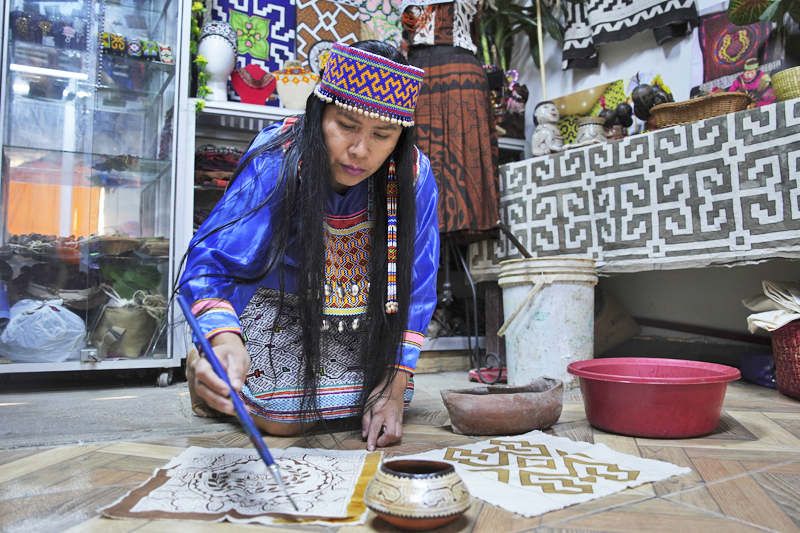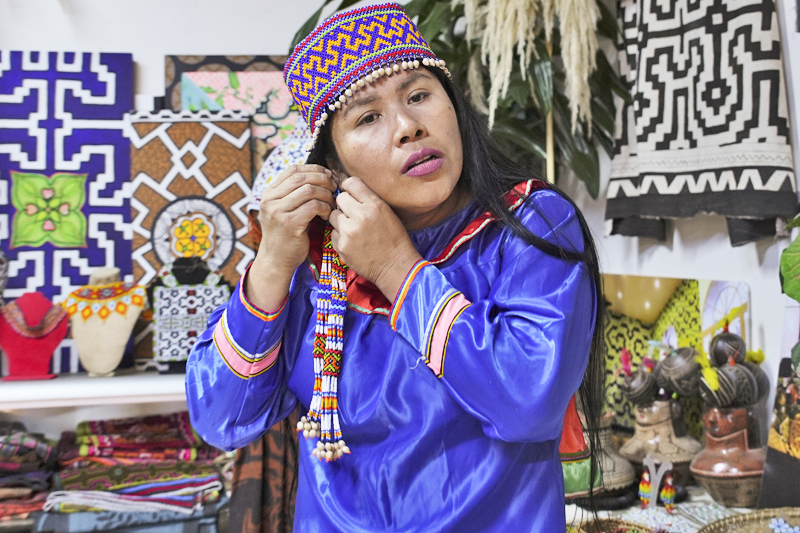LIMA – Sadith Silvano’s handmade crafts are born from ancient songs. With brush in hand and eyes focused on fabric, the Peruvian woman paints while singing. And through his voice, his ancestors seemed to speak.
“When we paint, we listen to the inspiration that comes from music and connect with nature, to our elders,” says Silvano, 36, from his home and workshop in Lima, Peru, where he moved two decades ago from Paoyhan, a Community of People Native Shipibo-Konibo located in the Amazon.
“Each of these works is something sacred,” he added. “We bless our work with the energy of our songs.”
According to official figures, almost 33,000 Shipibo-Konibo people live in Peru.
Settling around the Uyacali river, many of them moved to urban areas such as Cantagallo, a neighborhood in Lima where Silvano lived.


The hand-painted textiles he produces are gaining recognition. Known as kene, the textile was declared part of the National Cultural Heritage by the Peruvian government in 2008.
Each kene is unique, according to Shipibo craft women. Each pattern tells about a woman’s community, her worldview and her beliefs.
“Each design has its own story,” said Silvano, dressed in traditional clothing with his head decorated with beads. “It is the way a Shipibo woman distinguishes herself.”
The craft is passed down from one generation to another. Since wisdom is rooted in nature, the knowledge passed down by the elderly connects the younger generation to their native land.
Paoyhan, Silvano’s birthplace, requires a 12-hour air and boat trip to reach from Lima.
In his hometown, residents rarely speak any other language than Shipibo. The doors and windows have no locks, and they eat the fruits of nature.
Adela Sampayo, a 48-year-old healer who was born in Masisea, not far from Paoyhan, moved to Cantagallo in 2000, but says that all her skills come from the Amazon.
“From a young age, my mother treated me with traditional medicine,” said Sampayo, sitting in a lotus position inside the house where she provides ayahuasca treatments and other medicines for those with physical problems or wounded souls.
“He gave me plants to be stronger, to avoid diseases and to be brave,” said Sampayo. “That’s how the energy of the plants began to grow in me.”
Sampayo also conveys his view of the world through the textiles he produces. Although she doesn’t paint, she embroiders and each thread tells a story from her hometown.
The plants painted by Silvano also have their own meaning. One of them symbolizes pure love. Others represent a wise man. Another depicts a snake.
“Anaconda is very special to us,” said Silvano. “It is our protector, like a god who looks after us and provides food and water.”
In ancient times, he said, his people believed that the sun was their father and the anaconda was their guardian.
For years, after his father brought him to Lima in hopes of a better future, he often missed his mountains, clear skies and time alone in the forest. Life in Paoyhan was not easy, but from an early age he learned how to persevere.
In the 1990s, Amazonian communities were affected by violence from the Shining Path rebellion and illegal logging. Poverty and sexism are also common, which is why many Shibipo women learn to overcome their grief through the soulful music they sing.
“When we face difficult times, we overcome them with our therapy: designing, painting, singing,” says Silvano. “We have a song that sings and heals our souls, and another that inspires and brings us joy.”
According to Silvano, only a handful of Shipibo girls are encouraged to study or earn their own living. Instead, they are taught to wait for their husbands. And once married, they are taught to endure any abuse, infidelity or discomfort they may encounter.
“Even if we suffer, people will say to us: Just accept it, he is the father of your children. Just accept it, he is your husband,” said Silvano. “But deep down, we are hurt. So what do we do? We sing.” – AP

